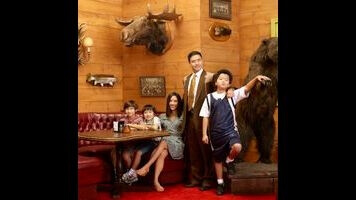Fresh Off The Boat presents a refreshing perspective for the family sitcom

It’s always dangerous when a show’s reputation precedes it. Ever since ABC announced Fresh Off The Boat, it has prompted a hailstorm of preemptive criticism, essays, and questionable questions. The show is based on chef Eddie Huang’s sharply funny and ruthless memoir of the same name. Huang also does the voiceover for Fresh Off The Boat, in the retrospective style of The Wonder Years, but he has been vocal about finding the series to be a watered-down version of his own stories. In a searing, lengthy piece for New York, he quotes a Chinese-American executive producer as saying:
This is a HISTORIC network-television show inspired by your life, and it’s going to get Americans excited about us. It’s never going to be the book… It’s Panda Express, and you know what? Orange chicken gets America really excited about Chinese people in airports.
While Huang wishes the show could be more provocative, he ultimately concludes that what’s important about Fresh Off The Boat isn’t his specific story. What’s important about Fresh Off The Boat is its all-too-rare perspective on a distinctly Asian-American experience. As many have pointed out, the last time an Asian-American sitcom was on the air was Margaret Cho’s All-American Girl in 1994. It’s unfair, but the pressure for Fresh Off The Boat to succeed is decidedly on.
The first episode is the weakest of the three screened for critics, since writer and showrunner Nahnatchka Khan (Don’t Trust The B—— In Apartment 23) has a lot of ground to cover in a very short amount of time. We very quickly meet Eddie (Hudson Yang) and his family, watch them move from Washington D.C.’s Chinatown to middle-of-somewhere Florida, and see the Wild West-themed restaurant his father Louis (Randall Park) has bought. This first episode then follows Eddie’s first humiliating day at school as the only Asian-American in town, his father’s plans to make the restaurant more local-friendly, and his mother Jessica’s (Constance Wu) attempts to fit in with the blonde, Rollerblading moms who rule the neighborhood. Yes, Rollerblading: This series, like Huang’s memoir, takes place in 1995. So it is a crowded pilot, which ultimately makes it more charming than funny. As the series gets more comfortable, though, the jokes come faster and more furiously.
As evidenced by its very title, Fresh Off The Boat does not talk its way around race. Several scenes per episode might have you watching though your fingers, due to secondhand embarrassment for the oblivious white suburbanites surrounding the Huangs. Some of these situations are more heavy-handed than others, but the actors behind the family deftly play the confusion, humiliation, and anger that arises when encountering racism.
The Huangs struggle between wanting to remain true to their Taiwanese-Chinese roots and wanting to fit in—or more accurately (and to their chagrin), assimilate. Each member of the family has their own way of coping. Eddie finds comfort in rap, which he tells us in voice-over was his way of finding people who also felt like outsiders. Even this backfires on him, though, when he gravitates toward the only black boy in the cafeteria and uses Notorious B.I.G. as an icebreaker. To Eddie’s dismay, Edgar wants nothing to do with him; associating with the other minority will only make his singularity stand out more. Eddie’s bombastic approach to life makes for good comedic moments, but his simultaneous heartbreak and defiance toward this rejection is the kind of gut-wrenching moment that immediately differentiates Fresh Off The Boat from a safer, whiter sitcom.
Meanwhile, Eddie’s younger brothers (Forrest Wheeler and Ian Chen) accept their new surroundings with shrugs and affable grins, quickly succeeding while the angrier Eddie falters. Their father Louis embraces every aspect of American culture he can find, even if he doesn’t fully understand them. Park employs an appealing wide-eyed sincerity that shows range beyond his slippery Senator Chung in Veep. Still, Park has less to do than expected, and Louis’ fruitless restaurant exploits (featuring Paul Scheer in an atypical straight-man role) are by far the least interesting parts of the show. Then again, Park’s role might just feel reduced because another member of the cast roars onto the screen, becoming the most dynamic part of Fresh Off The Boat: his TV wife, Constance Wu.
Where Park’s Louis is eager to understand his adopted country, Wu’s Jessica barely tolerates it. Jessica’s attempts to keep her family in order and use tofu and Stephen King to bond with the army of suburban wives are the highlight of the series so far, in large part thanks to Wu’s canny portrayal. She imbues Jessica with an unflappable sense of pride and the sharpest tongue for miles. When the women treat her like an amusing little token, Wu nails Jessica’s dual disgust and bewilderment. When she puts herself out there to find a real friend in this alien world, Wu lets Jessica’s steely disdain fall just enough so we can see her warmth. Credit must also go to the writing team for fleshing out Jessica’s character beyond “wife and mother.” The series devotes time to conveying that Jessica feels just as lonely and lost in Florida’s pastel world as Eddie does, and the contrast between how the two grapple with those feelings provides some of the series’ sharpest comedy and commentary.
Family sitcoms are a TV staple, but the best ones find kernels of startling truth in the middle of the jokes: Shows like All In The Family, Roseanne, The Bernie Mac Show, and now Black-ish found their footing by marrying their comedy with issues like race and class instead of skirting their way around them with a wink. Fresh Off The Boat may not be the take-no-prisoners depiction of Asian-American life that Huang originally envisioned, but it still provides a perspective long overdue on television in a way that’s at once smart, sweet, and funny—a far cry from “Panda Express.”